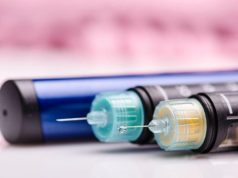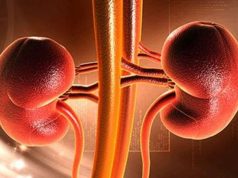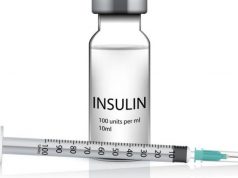Icodec results in greater increase in time-in-range versus once-daily insulin glargine U100 in two phase 2 randomized, open-label trials
THURSDAY, April 22, 2021 (HealthDay News) — Once-weekly insulin icodec is efficacious and well tolerated, according to two phase 2 studies published online April 19 in Diabetes Care.
Ildiko Lingvay, M.D., from the University of Texas Southwestern Medical Center in Dallas, and colleagues randomly assigned 205 insulin-naive adults with type 2 diabetes and hemoglobin A1c 7 to 10 percent while treated with oral glucose-lowering medications to once-weekly icodec titrations A (self-measured blood glucose target 80 to 130 mg/dL; adjustment ±21 units/week), B (80 to 130 mg/dL; ±28 units/week), or C (70 to 108 mg/dL; ±28 units/week) or to once-daily insulin glargine U100 (IGlar U100; 80 to 130 mg/dL; ±4 units/week). The percentage of time in range (TIR; 70 to 180 mg/dL) during weeks 15 and 16 was measured. The researchers found that from baseline to weeks 15 and 16, TIR improved in all groups. Compared with IGlar U100, TIR was greater for titration B (estimated treatment difference, 7.08 percent).
Harpreet S. Bajaj, M.D., M.P.H., from LMC Diabetes and Endocrinology in Brampton, Ontario, Canada, and colleagues conducted a multicenter, open-label trial involving eligible basal insulin-treated individuals with type 2 diabetes who were randomly assigned to icodec with an initial 100 percent loading dose (icodec LD), icodec with no loading dose (icodec NLD), or IGlar U100 for 16 weeks. The researchers found that during weeks 15 to 16, the estimated mean TIR was 72.9, 66.0, and 65.0 percent for icodec LD, icodec NLD, and IGlar U100, respectively, with a significant difference favoring icodec LD versus IGlar U100 (7.9 percent).
“A weekly insulin is a game changer that will decrease the treatment burden for patients while also improving compliance,” Lingvay said in a statement.
Several authors from both studies disclosed financial ties to pharmaceutical companies, including Novo Nordisk, which funded the study.
Abstract/Full Text – Lingvay (subscription or payment may be required)
Abstract/Full Text – Bajaj (subscription or payment may be required)
Copyright © 2021 HealthDay. All rights reserved.








